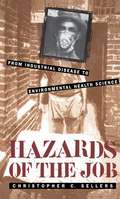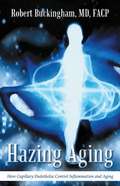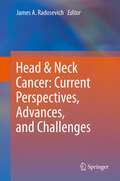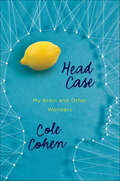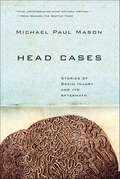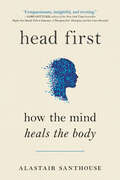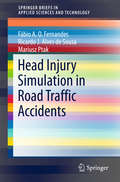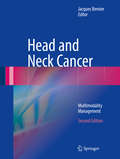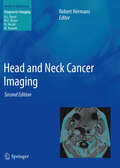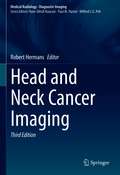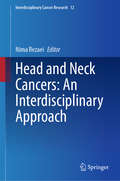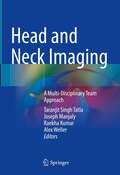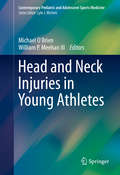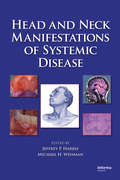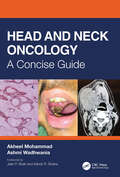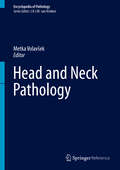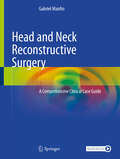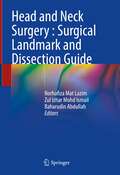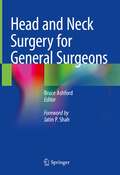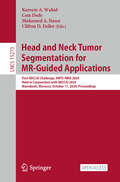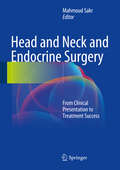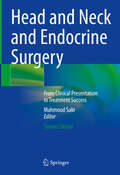- Table View
- List View
Hazards of the Job
by Christopher C. SellersHazards of the Job explores the roots of modern environmentalism in the early-twentieth-century United States. It was in the workplace of this era, argues Christopher Sellers, that our contemporary understanding of environmental health dangers first took shape. At the crossroads where medicine and science met business, labor, and the state, industrial hygiene became a crucible for molding midcentury notions of corporate interest and professional disinterest as well as environmental concepts of the 'normal' and the 'natural.' The evolution of industrial hygiene illuminates how powerfully battles over knowledge and objectivity could reverberate in American society: new ways of establishing cause and effect begat new predicaments in medicine, law, economics, politics, and ethics, even as they enhanced the potential for environmental control. From the 1910s through the 1930s, as Sellers shows, industrial hygiene investigators fashioned a professional culture that gained the confidence of corporations, unions, and a broader public. As the hygienists moved beyond the workplace, this microenvironment prefigured their understanding of the environment at large. Transforming themselves into linchpins of science-based production and modern consumerism, they also laid the groundwork for many controversies to come.
Hazing Aging: How Capillary Endothelia Control Inflammation and Aging
by Robert BuckinghamThe author argues that by focusing on the health of vascular endothelium cells, you'll improve endorgan function, reverse adverse effects of aging, and live a happier life.
He Wanted the Moon
by Eve Claxton Mimi BairdA mid-century doctor's raw, unvarnished account of his own descent into madness, and his daughter's attempt to piece his life back together and make sense of her own. Texas-born and Harvard-educated, Dr. Perry Baird was a rising medical star in the late 1920s and 1930s. Early in his career, ahead of his time, he grew fascinated with identifying the biochemical root of manic depression, just as he began to suffer from it himself. By the time the results of his groundbreaking experiments were published, Dr. Baird had been institutionalized multiple times, his medical license revoked, and his wife and daughters estranged. He later received a lobotomy and died from a consequent seizure, his research incomplete, his achievements unrecognized. Mimi Baird grew up never fully knowing this story, as her family went silent about the father who had been absent for most of her childhood. Decades later, a string of extraordinary coincidences led to the recovery of a manuscript which Dr. Baird had worked on throughout his brutal institutionalization, confinement, and escape. This remarkable document, reflecting periods of both manic exhilaration and clear-headed health, presents a startling portrait of a man who was a uniquely astute observer of his own condition, struggling with a disease for which there was no cure, racing against time to unlock the key to treatment before his illness became impossible to manage. Fifty years after being told her father would forever be "ill" and "away," Mimi Baird set off on a quest to piece together the memoir and the man. In time her fingers became stained with the lead of the pencil he had used to write his manuscript, as she devoted herself to understanding who he was, why he disappeared, and what legacy she had inherited. The result of his extraordinary record and her journey to bring his name to light is He Wanted the Moon, an unforgettable testament to the reaches of the mind and the redeeming power of a determined heart.
Head & Neck Cancer: Current Perspectives, Advances, and Challenges
by James A. RadosevichThis is a nearly complete collection of Chapters that provide an up to date overview of all aspects of Head and Neck cancer. It is written by professionals but is not only intended for other professionals, but students, patients, policy makers, etc. There are so many aspects to this group of diseases that even the most seasoned professional will learn something from having read this book.
Head Case: My Brain and Other Wonders
by Cole CohenA spirited, wry, and utterly original memoir about one woman's struggle to make her way and set up a life after doctors discover a hole the size of a lemon in her brain.The summer before she was set to head out-of-state to pursue her MFA, twenty-six-year-old Cole Cohen submitted herself to a battery of tests. For as long as she could remember, she'd struggled with a series of learning disabilities that made it nearly impossible to judge time and space—standing at a cross walk, she couldn't tell you if an oncoming car would arrive in ten seconds or thirty; if you asked her to let you know when ten minutes had passed, she might notify you in a minute or an hour. These symptoms had always kept her from getting a driver's license, which she wanted to have for grad school. Instead of leaving the doctor's office with permission to drive, she left with a shocking diagnosis—doctors had found a large hole in her brain responsible for her life-long struggles. Because there aren't established tools to rely on in the wake of this unprecedented and mysterious diagnosis, Cole and her doctors and family create them, and discover firsthand how best to navigate the unique world that Cole lives in. Told without an ounce of self-pity and plenty of charm and wit, Head Case is ultimately a story of triumph, as we watch this passionate, loveable, and unsinkable young woman chart a path for herself.
Head Cases: Stories of Brain Injury and Its Aftermath
by Michael Paul MasonA case manager shares stories of patients’ and families’ journeys and “deftly conveys the frustrations and inequities of traumatic brain injury” (Mary Roach, The New York Times Book Review).Head Cases takes us into the dark side of the brain in an astonishing sequence of stories, at once true and strange, about the effects of brain damage. Michael Paul Mason is one of an elite group of experts who coordinate care in the complicated aftermath of tragic injuries that can last a lifetime. On the road with Mason, we encounter survivors of brain injuries as they struggle to map and make sense of the new worlds they inhabit.Underlying each of these survivors’ stories is an exploration of the brain and its mysteries. When injured—by a bad fall, a viral infection, or some other misfortune—the brain must figure out how to heal itself, reorganizing its physiology in order to do the job. Mason gives us a series of vivid glimpses into brain science, the last frontier of medicine, and we come away in awe of the miracles of the brain’s workings and astonished at the fragility of the brain and the sense of self, life, and order that resides there. Head Cases “[achieves] through sympathy and curiosity insight like that which pulses through genuine literature” (The New York Sun); it is at once illuminating and deeply affecting.“Vivid, heartbreaking [and] movingly written.” —The Seattle Times“Tells stories of tremendous courage and perseverance as survivors and their families work to re-establish the everyday skills they had before their injury. The strange effects of neurological damage will draw fans of Oliver Sacks, but Mason’s poignant and caring accounts of his clients’ lives are sure to touch the hearts of a wide range of readers.” —Publishers Weekly (starred review)
Head First: How The Mind Heals The Body
by Alastair SanthouseIn the tradition of Lori Gottlieb and Henry Marsh, a distinguished psychiatrist examines his own practice. Alastair Santhouse knew something was wrong the night he was on call during his medical training and got the news that a woman on the way to the ER had died in the ambulance. That meant he could go back to sleep! But he couldn't. He was overtaken with the sense that his joyful reaction was terrible failure. That night began his long journey away from the ER and into psychiatry. Head First chronicles Santhouse's many years treating patients and his exploration of the ways in which our minds exert a huge and underappreciated influence over our health. They shape our responses to symptoms that we develop, dictate the treatments we receive, and influence whether they work. They even influence whether we develop symptoms at all. Written with brutal honesty, deep compassion, and a wry sense of humor, Head First examines difficult cases that illuminate some of our most puzzling and controversial medical issues--from the tragedy of suicide, to the stigma surrounding obesity, to the mysteries of self-induced illness. Ultimately he finds that our medical model has failed us by promoting specialization and overlooking perhaps the single most important component of our health: our state of mind.
Head Games: Medical Thriller
by Eileen DreyerShe's seen it all, until…Head Games, a Medical Thriller from Eileen Dreyer—2004 - St. Louis, Missouri—St. Louis death investigator and trauma nurse Molly Burke has seen just about everything, until gifts begin showing up on her doorstep—gifts like human eyes and painted bones—the signature of a twisted serial killer.Complicating the dangerous situation, Molly’s 16-year-old nephew unexpectedly shows up on her doorstep, with problems of his own.Now, Molly must balance the investigation into the mind of a monster, who’s taking her back to the worst years of her life, while launching a rescue mission for her nephew. The question is, will she survive either?Publisher’s Note: No one writes medical thrillers better than former Trauma Nurse, Eileen Dreyer. This tight medical thriller contains profanity consistent with the salty speech of crime investigators and does NOT contain sexual content.“A tensely plotted thriller that compels the reader to the last shocking page…Dreyer deftly displays her droll sense of humor while spinning a tale of taut terror…complex, riveting, funny, and compelling.” ~The Denver Post“Nearly flawless. The dialogue is witty, yet shot through with verisimilitude. The insights into hospitals, medical examiners’ offices, police departments, and the military are stunning.” ~St. Louis Post-DispatchOther Thrillers From Eileen DreyerA Man to Die ForNothing PersonalBrain DeadBad MedicineIf Looks Could KillCity of the DeadWith a VengeanceHead Games
Head Injury Simulation in Road Traffic Accidents (SpringerBriefs in Applied Sciences and Technology)
by Ricardo J. Alves de Sousa Mariusz Ptak Fábio A. FernandesIn this work the development of a new geometrically detailed finite element head model is presented. Special attention is given to sulci and gyri modelling, making this model more geometrically accurate than others currently available. The model was validated against experimental data from impact tests on cadavers, specifically intracranial pressure and brain motion. Its potential is shown in an accident reconstruction case with injury evaluation by effectively combining multibody kinematics and finite element methodology.
Head and Neck Cancer
by Jacques BernierIn recent years, great advances in translational research have led to new paradigms in the treatment of cancers of the head and neck. Written by leading international physicians and investigators, this innovative multi-disciplinary book presents the most up-to-date research and clinical approaches. Coverage is given to progress in a variety of clinical settings, including programs of organ and function preservation, curative treatments, unresectable disease, adjuvant treatments in high-risk patients, and recurrent/metastatic disease. Complementary to the techniques of surgery, radiotherapy, and systemic treatments, the authors present data on epidemiology, molecular pathology, normal tissue complications, rehabilitation, palliative care, and treatment in the elderly. State-of-the-art functional imaging is elucidated; and the latest developments in high precision techniques in irradiation, sequencing of chemo- and radiotherapy, as well as the integration of biomolecular therapies into cytotoxic treatments are explored.
Head and Neck Cancer Imaging
by Robert HermansImaging is crucial in the multidisciplinary approach to head and neck cancer management. The rapid technological development of recent years makes it necessary for all members of the multidisciplinary team to understand the potential applications, limitations, and advantages of existing and evolving imaging technologies. It is equally important that the radiologist has sufficient clinical background knowledge to understand the clinical significance of imaging findings. This book provides an overview of the findings obtained using different imaging techniques during the evaluation of head and neck neoplasms, both before and after therapy. All anatomic areas in the head and neck are covered, and the impact of imaging on patient management is discussed in detail. The authors are recognized experts in the field, and numerous high-quality images are included. This second edition provides information on the latest imaging developments in this area, including the application of PET-CT and diffusion-weighted magnetic resonance imaging.
Head and Neck Cancer Imaging (Medical Radiology)
by Robert HermansThis book is a comprehensive guide to imaging as a crucial part of the multidisciplinary approach to head and neck cancer management. Readers will find a detailed overview of the findings obtained using different imaging techniques during the evaluation of head and neck neoplasms, both before and after therapy. All anatomic areas in the head and neck are covered, and the impact of imaging on patient management is discussed in detail. Full account is taken of the rapid technological developments of recent years, with explanation of the potential applications, limitations, and advantages of existing and evolving imaging technologies – vital knowledge for all members of the multidisciplinary team. The authors are recognized experts in the field, and numerous high-quality images are included. This third edition includes information on the latest imaging developments in this area as well as the most recent staging classification of head and neck cancer.
Head and Neck Cancer: Psychological and Psychosocial Effects
by Christopher E. FundakowskiThis volume serves to help readers understand and address factors that contribute to the psychological distress and negative self-perception of patients with head and neck cancer to improve their quality of life. It explores many of these issues in depth, such as the trends in diagnosis of head and neck cancer, disfigurement, advances and outcomes associated with minimally invasive surgery, long-term quality of life and functional outcomes, issues related to cancer pain, importance and impact of nutrition, how reconstructive advances effect functional outcomes, the impact of cancer recurrence, and financial consequences of cancer diagnosis and treatment. Head and Neck Cancer: Psychological and Psychosocial Effects will help otolaryngologists, oncologists, surgeons, psychologists and healthcare professionals define the unique issues associated with the HNC patient population, discuss pertinent data, outline key aspects of high quality care in this population, and to draw attention to necessary future investigations and developments.
Head and Neck Cancers: An Interdisciplinary Approach (Interdisciplinary Cancer Research #12)
by Nima RezaeiThe twelfth volume in the “Interdisciplinary Cancer Research” series, titled “Head and Neck Cancers: An Interdisciplinary Approach,” offers comprehensive reviews on the diagnostic and treatment of head and neck cancers. It begins with an overview of interdisciplinary methods in this field. The book also delves into the role of the microbiome and the evolving understanding of virus-immune system interactions in head and neck cancer. Other chapters focus on circulating tumor cells, extracellular vesicles, and circulating non-coding RNAs. Additionally, it discusses novel therapeutic targets, including lipid levels, oxidative stress, antihypoxic agents, and senotherapy. This volume is part of the Cancer Immunology Project (CIP), part of the Universal Scientific Education and Research Network (USERN), and it is particularly valuable for researchers, head and neck oncosurgeons, and oncologists looking to expand their knowledge in this area.
Head and Neck Imaging: A Multi-Disciplinary Team Approach
by Joseph Manjaly Taranjit Singh Tatla Raekha Kumar Alex WellerThis book provides a practically applicable guide to the all the different imaging modalities used in the diagnosis and management of ENT & Head and Neck patients. It bridges the gap in understanding between surgeons treating ENT & Head and Neck conditions and radiologists who oversee the process of scan requests, interpretation and delivering reports that best inform the subsequent management. Chapters cover a variety of sub-specialist areas including plain films, ultrasound, computed tomography (CT), magnetic resonance imaging (MRI), auditory implantation, paediatrics, head and neck cancer, trauma, three dimensional (3D) reconstruction and rehabilitation including swallow. This book facilitates surgeons and radiologists to further develop their understanding of each other’s perspectives on clinical decision-making and appropriately interpreting the outputs from a range of imaging modalities. Head and Neck Imaging: A Multi-Disciplinary Team Approach is a resource well-suited to all trainees, residents, consultants who use these techniques to treat patients with head and neck symptoms. Furthermore, it is vital for those individuals preparing for exams in disciplines such as ear nose and throat, maxillofacial surgery and radiology.
Head and Neck Injuries in Young Athletes
by Michael O'Brien William P. MeehanProviding the most current information on injuries to the head and neck sustained by young athletes, this practical text presents a thorough review of the complex and emerging issues for youths and adolescents involved in contact/collision sports. While concussions are among the most common injuries, fractures of the skull and facial bones and structural brain injuries can be serious and are discussed in chapters of their own, as are stingers and other cervical spine and cord issues and disease. Injuries to the eyes, ears and jaw are likewise examined. Prevention is a major theme throughout the book, as seen in chapters on protective head- and neckwear, transportation of injured players, and sideline response and return-to-play. Head and Neck Injuries in Young Athletes will be an excellent resource not only for orthopedists and sports medicine specialists treating growing athletes, but also specialists and team physicians who are on the scene at sporting events where these injuries may occur.
Head and Neck Manifestations of Systemic Disease
by Jeffrey P. Harris Michael H. WeismanOriginally published in 2007 and now available for the first time in paperback format, Head and Neck Manifestations of Systemic Disease presents critical information on a multitude of maladies that have manifestations in the head and neck. The book relates commonly encountered head and neck symptoms and signs to an array of diseases and disorders that should be considered in the differential diagnosis. Offering a hands-on approach, this volume addresses specific disease classifications and commonly encountered signs and symptoms in the head and neck region. It offers a clinical approach to disease diagnosis by analyzing the possible causes of a patient's symptoms. The contributors present evidence-based therapeutic options for a variety of conditions, from infections and rheumatologic conditions to hematologic and neoplastic disease. Organized by disease type for easy reference, the book offers a variety of lucid color photographs, providing a unique reference for clinicians who manage diseases with symptoms in this region.
Head and Neck Oncology: A Concise Guide
by Mohammad Akheel Ashmi WadhwaniaThis concise handbook has a unique approach and covers all important aspects of head and neck cancers from basic topics like carcinogenesis to advanced treatment options such as immunotherapy, electrochemotherapy, and robotic surgery in a succinct way. As every treatment center manages its patients with a different modality as per their institutional protocol, this book endeavors to standardize the processes by discussing the management of cancers of all anatomic areas in view of the National Comprehensive Cancer Network (NCCN) guidelines, which is the committee that prepares protocols for management of cancers and every head and which neck oncosurgeons must adhere to for their clinical practice. Key Features Explains the topics through flowcharts and diagrammatic representations that are helpful for exam preparation This book aims to serve as a valuable resource for postgraduate residents of maxillofacial surgery, ENT and otolaryngology, general surgery, plastic surgery, and junior specialists Serves as a comprehensive, evidence-based quick reference for the clinician on the go
Head and Neck Pathology
by Metka VolavšekThis book covers the complete field of head and neck pathology – from Abscess to Wegener`s Granulomatosis, Sinonasal. The alphabetically arranged entries, each of which provides a detailed description of a specific pathological disease pattern, allow readers to quickly and easily find the information they need.
Head and Neck Reconstructive Surgery: A Comprehensive Clinical Case Guide
by Gabriel ManfroThis comprehensive guide discusses the most frequent defects encountered in the surgical treatment of head and neck cancer, showcasing real clinical cases. It consistently highlights the clinical image and the histological diagnosis and outlines the key points to be considered when choosing the reconstruction technique. Each chapter delves into a specific surgical technique, offering a deep dive into its principles, applications, advantages, and outcomes. It also includes follow-up and short- and long-term results. From the Facial Artery Musculomucosal Flap (FAMM Flap) to the Gastric Pull-Up, the work presents reconstructive procedures using microsurgical and locoregional pedicled flaps, through a collection of 108 clinical cases, each accompanied by detailed descriptions, videos and over 500 stunning original surgical illustrations. Head and Neck Reconstructive Surgery is an essential resource for head and neck surgeons, plastic surgeons, cancer surgeons, oncologists, and anyone involved in restoring both form and function to patients with complex head and neck defects.
Head and Neck Surgery : Surgical Landmark and Dissection Guide
by Norhafiza Mat Lazim Zul Izhar Mohd Ismail Baharudin AbdullahThis book provides concise critical points used during most types of head and neck surgeries combined with captivating figures and labeled photographs as well as live surgery photographs. Important head and neck surgery such as thyroid surgery, salivary glands surgery, sinonasal surgery, laryngeal surgery, and neck dissection are incorporated in this book. Each chapter starts with the anatomical description of the surgical structures with labelled photographs, in order to facilitate the reader's understanding the anatomic region of the surgical structures, the diseases related to the highlighted structures and its surgery. The specific type of surgeries indicated for specific diseases are provided and discussed in a concise manner. Surgical procedures have also been presented in a clear and easily comprehensible manner using both important anatomical and surgical landmarks. Attractive labels and arrows are inserted alongside the figures. This book will be an excellent guide book especially for both undergraduate and postgraduate students, junior surgeons, clinicians, anatomy dissectors, scientists, as well as general academia. It will also be a valuable reference source for the junior head and neck surgeons and trainees in the head and neck surgical oncology specialty.
Head and Neck Surgery for General Surgeons
by Bruce AshfordGeneral surgery is the common ancestor of all surgical specialties. Within general surgery, many subspecialty areas of practice have evolved. This book is the first manual recognizing the growing role General Surgeons play in Head & Neck Surgery. From benign to malignant conditions and form ablative to reconstructive challenges, the renowned comprehensive capability of the General Surgeon is well suited to demands of this discipline. Each chapter details relevant anatomical considerations to enable understanding of this complex regional specialty and the full range of head and neck pathologies with requisite assessment, investigation, surgical and relevant reconstructive techniques. Written by a multidisciplinary, international team of recognized experts, this textbook is a practical but comprehensive guide for both candidates preparing for final surgery examinations as well as general surgeons requiring an up-to-date source of definitive advice on topics of this regional specialty.
Head and Neck Tumor Segmentation for MR-Guided Applications: First MICCAI Challenge, HNTS-MRG 2024, Held in Conjunction with MICCAI 2024, Marrakesh, Morocco, October 17, 2024, Proceedings (Lecture Notes in Computer Science #15273)
by Kareem A. Wahid Cem Dede Mohamed A. Naser Clifton D. FullerThis Open Access book constitutes the refereed proceedings of the First MICCAI Challenge, HNTSMRG 2024, Held in Conjunction with MICCAI 2024, in Marrakesh, Morocco, on October 17, 2024. The 20 full papers and 1 overview paper included in this volume were carefully reviewed and selected from a total of 21 submissions. The HNTS-MRG 2024 Challenge focuses on advancing clinical workflows by leveraging artificial intelligence (AI) for automated segmentation of tumor regions in multi-timepoint MRI scans.
Head and Neck and Endocrine Surgery
by Mahmoud SakrThis book addresses a wide range of topics relating to head and neck and endocrine surgery, including: maxillofacial injuries, surgery of the scalp, surgery of the salivary glands, jaw tumors, surgery of the oral cavity (lips, tongue, floor of the mouth, and palate), swellings and ulcers of the face, inflammation in the neck, cervical lymphadenopathy, midline and lateral neck swellings, tumors of the pharynx, and endocrine surgery (thyroid gland, parathyroid glands, suprarenal glands, and neuroendocrine tumors). The aim is to clearly describe and illustrate how to diagnose and treat diverse conditions in accordance with evidence-based practice. The coverage thus extends beyond surgical indications and procedures to encompass aspects such as anatomy, clinical presentation, and imaging diagnosis. The book has been structured in such a way as to facilitate quick reference. While it is primarily intended for practitioners, it will also be suitable for upper graduate students.
Head and Neck and Endocrine Surgery: From Clinical Presentation to Treatment Success
by Mahmoud SakrThis revised and expanded second edition provides a comprehensive and up-to-date overview of topics relating to head and neck and endocrine surgery, including: maxillofacial injuries, surgery of the scalp, surgery of the salivary glands, jaw tumors, surgery of the oral cavity (lips, tongue, floor of the mouth, and palate), swellings and ulcers of the face, inflammation in the neck, cervical lymphadenopathy, midline and lateral neck swellings, tumors of the pharynx, and endocrine surgery (thyroid gland, parathyroid glands, suprarenal glands, and neuroendocrine tumors). This second edition also includes additional and detailed chapters on thyroidectomy procedures, thyroid and parathyroid endocrine emergencies, thyroid and parathyroid disease during pregnancy, and thyroid and parathyroid transplantation. The coverage extends beyond surgical indications and procedures to encompass aspects such as anatomy, clinical presentation, and imaging diagnosis. With its clear structure, the book facilitates quick reference and will serve as a valuable tool for practitioners, as well as for upper-level graduate students.
